5 Food Allergy Prevention Tips from Feeding Experts
- How offering allergenic foods to babies “early and often” can help reduce the risk of food allergies
- The lack of data that supports offering infants a new food every 3-5 days and how about 30% of pediatricians still advise to follow this practice
- The positive benefits of a diverse diet in babies and how this can play a role in a baby's microbiome
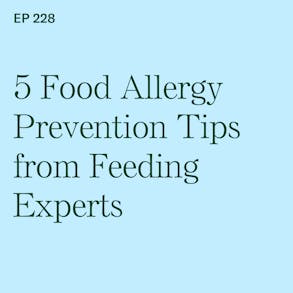
LISTEN TO THIS EPISODE
Episode Description
How can I help lower the risk of food allergies for my baby? Why should babies be introduced to foods early and often? Can allergenic foods be prepared safely for my baby?...In this episode I am sharing some of the best allergy prevention tips from five different feeding experts who specialize in food allergy research and practice. Listen and learn the latest facts about how the introduction of allergenic foods can help reduce the risk of allergic reactions for babies while baby-led weaning.
Links from This Episode
- Baby-Led Weaning with Katie Ferraro program with the 100 First Foods™ Daily Meal Plan, join here: https://babyledweaning.co/program
- Baby-Led Weaning for Beginners free online workshop with 100 First Foods™ list to all attendees, register here: https://babyledweaning.co/baby-led-weaning-for-beginners
Other Episodes Related to this Topic
Episodes with each expert included in this episode:
- Episode 125 - Why are False Positive Results in Food Allergy Testing so Common? with David Stukus, MD
- Episode 84 - Why You DON'T Need to Wait 3-5 Days Between New Foods with Carina Venter, PhD, RD
- Episode 180 - Food Allergy FAQ with Ruchi Gupta, MD, MPH
- Episode 202 - Gut Check: Microbiome and Food Allergy Development with Liam O'Mahony, PhD
- Episode 216 - Food Allergy & Kids: What’s New and Notable with Ron Sunog, MD
Other allergy episodes:
- Episode 124 “Using an Egg Ladder for Babies with Egg Allergy with Carina Venter, PhD, RD”
- Episode 125 “Why are False Positive Results in Food Allergy Testing so Common? with David Stukus, MD”
- Episode 126 “EAT THE 8: How to Use Food to Prevent Food Allergy (...and skip the supplement powder stuff!)”
- Episode 129 “Exploring the Eczema & Food Allergy Risk Link with Rebecca Hartman, MD, MPH”
- Episode 131 “Dairy Free Cooking for Food Allergies Babies with Kathlena The Allergy Chef”
- Episode 180 “Food Allergy FAQ with Ruchi Gupta, MD, MPH”
- Episode 202 “Gut Check: Microbiome and Food Allergy Development with Liam O'Mahony, PhD”

Latest Episodes

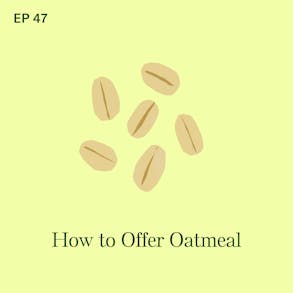

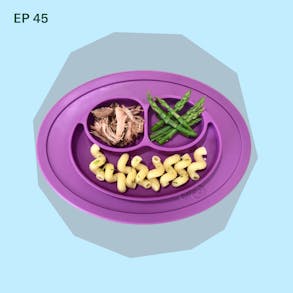
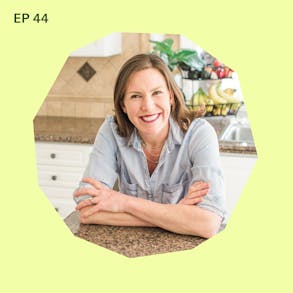
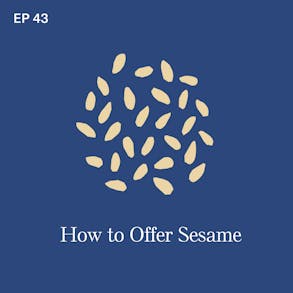
David Stukus (59s):
As research and science has evolved. We now have wonderful randomized controlled trials that really support the earlier that we give allergenic foods to babies and keep it in the diet. That's our best path was preventing Food Allergy.
Katie Ferraro (1m 14s):
Hey there I'm Katie Ferraro Registered Dietitian college nutrition professor and mom of seven specializing in bab-led weaning here on the baby-led weaning made easy podcast. I help you strip out all of the noise and nonsense about feeding, leaving you with the competence and knowledge. You need to give your baby a safe start to solid foods using baby Led Weaning. All right, tell me how you're doing with the introduction of allergenic foods for your baby. Some of you guys might be like, Katie, I'm fine. Leave me alone, whatever, but there are some parents and caregivers for whom introducing allergenic foods can be a really scary part of the transition to solid foods for their baby.
Katie Ferraro (1m 57s):
And while it's still very unlikely that your baby will develop a food allergy, food allergies are on the rise. And there's still so much that we do not know about food allergy prevention and risk, but every day and week, and month and year, we really are learning more and more from research and updated guidelines, Ford by expert committees. And all of this is helping to make things a little bit more clear, a little bit less hazy now for allergenic food introduction. And those of you who are listening, who might be fearful about doing this one thing that I always ask parents to remember, and I find it helps ease their mind is knowing this fact, the one thing you can do to lower the risk of your baby, developing a food allergy is to introduce allergenic foods early and often.
Katie Ferraro (2m 41s):
Now I spend a lot of time on the podcast and in my teaching programs, teaching families and caregivers, healthcare practitioners, daycare providers, how to safely introduce allergenic foods with food. Okay, you do not have to buy expensive gimmicky supplement programs that sell you powders or stick packs or mix-ins for Allergan introduction. Okay. Babies can learn to eat real food versions of allergenic foods. And so in today's episode, I'm bringing back five previous guests. Who've all been on the podcast, all of whom specialize in food, allergy research and practice. And these are some of the leading experts in food allergy from around the world. And I want to share their tips or having them share their tips to inspire you to stick with it when it comes to introducing allergenic foods early and often.
Katie Ferraro (3m 27s):
And if you've listened to this podcast for any length of time, you know that as a Registered Dietitian, specializing in baby-led weaning, I am a stickler for only bringing on the leading credentialed feeding experts to talk about medical issues related to infant feeding. It is so important that we are getting our information about feeding babies from credentialed, reputable, and evidence-based sources, not from bloggers, not from influencers, not from supplement companies who scare you into thinking your baby can't eat real food. So with no further ado, I want to share these five Food Allergy Prevention Tips from Feeding Experts. All right, first up coming right out of the gate, strong with Dr. David Stukus.
Katie Ferraro (4m 8s):
He is on social @allergykidsdoc, if you are not already following him, please do. He has such an incredible way of conveying really complex information in a way that makes it a simple and actionable for parents to do. He is a pediatric allergist who specializes in food allergies. He runs all of the Food Allergy training at nationwide children's hospital. And I am so grateful that he's here to share some tips about food allergy prevention.
David Stukus (4m 31s):
We have done an amazing job as pediatricians and allergists at simply scaring the hell out of parents everywhere. And the reason why is because 20 years ago, we thought it was the best advice to avoid giving certain foods. The recommendations were give no dairy into one, no eggs, still tube nuts, or seafood two, three. And if you're pregnant or breastfeeding, don't eat anything at all, because you're going to cause your kid to have food allergies. Well, it turns out that there wasn't much evidence to support that. It made sense based upon our understanding of the immune system at the time as research and science has evolved, we now have wonderful randomized controlled trials that really support the earlier that we give allergenic foods to babies and keep it in the diet, let them eat it.
David Stukus (5m 14s):
Don't rub it on the skin. We want to let them eat it, expose it to the immune system, through the gut and keep it in the diet on a consistent basis. That's our best path towards preventing Food Allergy.
Katie Ferraro (5m 24s):
I love any opportunity to learn from Dr. Stukus and I love his down to earth and practical recommendations for parents and caregivers. Next up is Carina Venter. She is a Registered Dietitian and a PhD. She's an international researcher, a leading expert who is here reminding us that there is absolutely no data to support the recommendation to wait three to five days between new foods.
Carina Venter (5m 49s):
So the interesting thing is I work very closely with Dr. Ruchi Gupta, who recently published a paper on this, indicating that up to about 30% of pediatricians, still advise families to follow this advice. And I E waiting three to five days trying new foods. And so when we went back and tried to find where this originate from, we cannot actually find the regional data, but it is clearly that advice that is currently displayed and available on the American academy of pediatrics website and also on the centers for disease control website. So the AAP and the CDC still advise parents to wait three to five days between introducing new foods.
Carina Venter (6m 33s):
And we are hoping that they will be reviewing this advice soon.
Katie Ferraro (6m 38s):
And Carina has been on the podcast a number of times, and I'm so grateful for her sharing her expertise. She's an internationally renowned expert in pediatric food allergies. And she's come on to talk about milk, ladders and egg ladders, and I've had the fortune to be learning from her. Actually the whole last year, I've been enrolled in an advanced level Food Allergy training course taught by Carina and Marion Groetch who is going to be on the podcast as well. So I love just being able to bring them into the podcast and have them share like little snippets of some of the bigger concepts that we're learning in our pediatric Food Allergy class for dieticians. So next up is Dr. Ruchi Gupta. Like I couldn't believe it when she said yes, when I invited her to be on the podcast. She's very, very well known in the world of pediatric food allergies.
Katie Ferraro (7m 20s):
And I think pediatric food allergy researchers are really unique or at least the ones that I've had the good fortune to make connections and relationships with and then have on the podcast and work with in other facets because they're like normal people. Cause I was like so scared when I was going to meet Dr. Gupta and interviewer. I was like, oh my God, she's totally cool. And there's like a mom who happens to work at a really cool area of research. So I hope you enjoy this tip from Dr. Ruchi Gupta. She is also the author of a book called food without fear. And I'm going to link to all of these experts, previous interviews, plus their resources on the show notes page. For this episode, if you go to BLW podcast.com/228, you can find everything linked up there. Here's Dr.
Katie Ferraro (8m 0s):
Ruchi Gupta.
Ruchi Gupta (8m 1s):
So introduce peanut products early, kind of went over how get it into their diet, you know, not their first food, of course, but early in that six month period. And if your baby is high risk, get them to an allergist at four months, even introducing earlier, getting it in their diet may truly prevent their allergy. And as far as the other foods go, you know, there is no data on it. Like I said, we're doing a large study to look at the other foods, but we do encourage a diverse diet. I think it's so important. So if you're comfortable introducing some of the other allergenic foods, do it early in life.
Katie Ferraro (8m 33s):
She's awesome. I have like five other topics. I want to have her back on to talk about in Food Allergy in the future. But next up is Dr. Liam O'Mahony. He is the micro-biome guy, and sometimes it's a little hard to make the concept of microbiome. Very interesting, but it's linked to this notion of diet diversity. And in 2016, I created the hundred FIRST FOODS approach to starting solid foods with baby Led Weaning and the whole hundred FIRST FOODS phenomenon and enterprise it's really caught on. It's been just fascinating watching parents and caregivers experience this really important milestone with their babies all over the globe. But the notion of the a hundred FIRST FOODS ties in to diet diversity.
Katie Ferraro (9m 14s):
And you guys are going to be hearing more and more about diet diversity because everyone you heard on the podcast today with the exception of Stukus actually, and Dr. Sunog has coming up, but the other three researchers they're doing tons of stuff, showing the importance of introducing a greater, greater, greater, bigger variety of foods and babies traditionally eat. And there's only beneficial things when we can get your baby to eat a lot of different foods. So next up is Dr. Liam O'Mahony. He's going to be talking a little bit about diet diversity, which helps for lots of things, including your baby's microbiome.
Liam O'Mahony (9m 43s):
Carina Venter has recently shown that diversity, even during pregnancy is important and particularly diversity in fruits and veg, just not diversity and fast foods. It's really, you know, it's diversities in the foods that we are know are, you know, in teary healthy and good for us. And I guess that's what we're doing. We're starting to put some science behind this to actually identify what, how are these foods healthy? And it seems by giving a wide diversity of these types of foods as well to the mom as well, to the infant, you're driving all these different types of bacteria or you're supporting them. And you get a wide breadth of metabolites that are made that really support the immune system effectively.
Liam O'Mahony (10m 26s):
So diversity in all walks of life is so good for your system.
Katie Ferraro (10m 31s):
I love Dr. O'Mahony. And one funny story is that when I was interviewing him the first time I was like, his name is spelled like, oh, dash Mahoney. And I was like, can you just please tell me how to pronounce her name? So I don't mess it up on the podcast. And he was like, oh, well, if you're American, you can just call me O'Mahony. And I was like, no, dude, like, tell me, how do you say your name in Ireland? He's like, it's O'Mahony. I was like, all right, he's Dr. O'Mahony. So final expert he's last but not least, certainly Dr. Ron Sunog. So a lot of you guys have gotten to know Dr. Sunog. If you've listened to the podcasts, he is at this point, I can call him a friend. We never actually met in real life. We have an entire course together on introducing allergenic foods. I've done a ton of Instagram lives and a lot of podcasts, episodes, and lots of other cool work with Dr. Sunog, but he is a medical doctor, his pediatrician, he specializes in helping families use food to introduce allergenic foods.
Katie Ferraro (11m 16s):
Like how novel, like when you find a pediatrician who not only like likes nutrition and then is like really up on the Food Allergy guidelines and also has written a book called eat the eight. So the big eight or the big eight allergenic foods, that account for about 90% of Food Allergy recently Sesame was added. So now there's technically nine, but Dr. Sunog has like such a cool way of communicating both with practitioners and like he's really big on helping pediatrician share with families, these new guidelines about early introduction. And they're not that new, but a lot of pediatricians still aren't doing it, but he also has a great job of explaining some more complex concepts to parents. And so that's why I love teaching with him and working with him in our course eat the eight is all about how to introduce allergenic foods safely to babies using food.
Katie Ferraro (11m 57s):
Cause we know the reality, you guys are out there getting tons of pressure from supplement companies that are scaring you into thinking that babies can't eat allergenic foods and you need to buy all this expensive gimmicky supplement junk instead of feeding food. And we're big advocates for food. So I just want to close out this episode with a little bit of inspiration from Dr. Ron Sunog author of eat the eight
Ron Sunog (12m 20s):
In may of 2021, a group of allergy experts did a big review looking at everything we know about Food Allergy Prevention and the authors of this study included Carina Venter and Dr. Ruchi Gupta both again, friends of yours and friends of the podcast and also Dr. Lee young, who I just mentioned, and of course, who else, Dr. Gideon lack, and they emphasized that the things you can do to prevent allergy include keeping your baby skin healthy. And Katie you're going to like this one, eat a diverse diet during pregnancy and feed your baby a diverse diet, including the allergens. Okay. So this is somewhat repetitive, but again, they did a review and looked at all the information we have and found that there's just a lot of strong evidence for this.
Ron Sunog (13m 8s):
They also found that a healthy microbiome that's having the right friendly germs on the skin and in the digestive track seemed to play a role. But on that front, we need a lot more study to know really how we recommend that to families.
Katie Ferraro (13m 24s):
Well, I hope that little mashup of inspiration from five different Food Allergy feeding experts is encouraging you to stay the course, stick with it. When it comes to introducing allergenic foods early and often you have the power to help reduce risk. There's nothing we can do to completely eliminate the risk. But I do like knowing, like, all right, what does the research show as far as like steps that I actually have control over, right? Cause there's a lot of things, especially with regards to genetics and environment that we can not control when it comes to Food Allergy risk, but something we do have control over is making sure our babies eat safe versions of allergenic foods early and often. So for more information about all of the experts that you heard about from today's episode, I'm going to link all the resources up plus their previous episodes.
Katie Ferraro (14m 7s):
If you want to just like get down and dirty with learning about allergenic food introduction for your baby. Go to the show notes page for this episode at blwpodcast.com/228. And thank you so much for listening.

The Program Baby-Led Weaning with Katie Ferraro
A step-by-step digital program for starting solid foods safely and navigating the original 100 FIRST FOODS™ meal plan with baby-led weaning.
 EXPERT-LED, PROVEN APPROACH TO EATING REAL FOOD
EXPERT-LED, PROVEN APPROACH TO EATING REAL FOOD CONCISE VIDEO TRAININGS TO MASTER BABY-LED WEANING
CONCISE VIDEO TRAININGS TO MASTER BABY-LED WEANING 100 FIRST FOODS DAILY MEAL PLAN WITH FOOD PREP VIDEOS
100 FIRST FOODS DAILY MEAL PLAN WITH FOOD PREP VIDEOS
Baby-Led Weaning for Beginners Free Workshop
Is your baby ready to start solid foods, but you’re not sure where to start? Get ready to give your baby a solid foundation to a lifetime of loving real food…even if you’re feeling overwhelmed or confused about this next stage of infant feeding.
Get baby-led weaning recipes and tips delivered to your email inbox.

